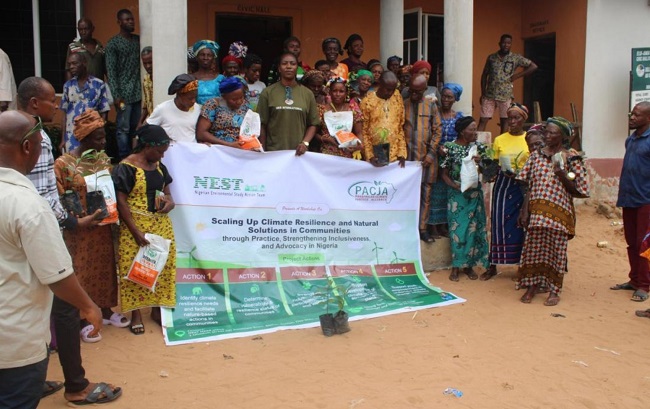The Nigerian Environmental Study Action Team (NEST), with funding from the Pan African Climate Justice Alliance (PACJA), is implementing the “Scaling Up Climate Resilience and Nature Solutions in Communities through Practice, Strengthening Inclusiveness, and Advocacy in Nigeria” project, whose goal is to build community resilience towards climate change in response to sub-national needs and contributing to national adaptation targets.

The pilot scheme of the project has commenced in Abia State and will be replicated in five more states.
In order to ensure sustainability of the project’s goal even after the official cessation of the project, NEST is collaborating with the Department of Forestry and Environmental Management (FOREM), Michael Okpara University of Agriculture, Umudike (MOUAU), and the Abia State Department of Forestry in the implementation of the project.
In continuation of the community exercises, the project team, led by the Project Coordinator, Prof Emmanuel C. Nzegbule, engaged the Eluama Lodu community in Abia State on March 27, 2025. Eluama harbours one of the remarkable forest reserves in the state. On arrival, the team was welcomed by over 100 community members.
The Project Coordinator commended the community for the impressive turn out and highlighted the purpose of the community engagement, which were:
- Validating the earlier findings about the community’s vulnerability status, climate change hazards, impact and resilience needs;
- Promoting inclusion of vulnerable groups in decision making and climate resilience practices;
- Building the community’s climate resilience capacity; and,
- Empowering the community members particularly the youths and vulnerable groups with various climate resilience skills and improved agricultural inputs.
At the interactive session the participants from Eluama community mapped the community’s vulnerability features; identified the major climate hazards and impacts; identified and prioritised needs of the community for achieving climate resilience for both women, the youths and men. Also, they were enlightened on the importance of gender inclusiveness, usefulness of climate Smart agriculture and agroforestry practices in order to achieve climate resilience.
From the findings, over 90% of the Eluama are already aware of climate change and could recognise some of the evidence in the community. The community is highly vulnerable to climate change impact because of various socioeconomic and infrastructural deficits including dilapidated earthen road networks which hampers evacuation of farm products to the markets; poor access to market leading to huge post-harvest losses and making sales of farm produce difficult; lack of water sources for domestic and irrigation purposes.
Agriculture in Eluama community is subsistence and rainfed. They hardly receive improve agricultural inputs and extension services. Traditionally, the women do not inherit land nor own one which denies them access to natural resources and worsens women vulnerability; and access to credits for farming is very limited as the closest bank is about 10 km from the community.
Some of the climate change impacts in the community as disclosed by the participants include uncertainty in the pattern of rainfall, heat stress, drying of their local streams, poor yield of their crops, increase in agricultural pests – monkeys destroy their crops leading to huge losses, increase in incidence of wind storms and erosion etc.
The priority needs of Eluama people to realise community resilience include: creating better access to water for domestic use and dry season irrigation farming; checking illegal harvesting of woods from their forests; provision of improved seeds and farming equipment; control of wildlife pestilence on their farms; and creating alternative livelihoods opportunities.
The team sensitised and built the skills of the participants on climate smart agriculture (CSA) and agroforestry practice. The Head of FOREM Department, MOUAU, Dr Benson Nwajiobi, facilitated the exercise. He discouraged deforestation which is a major driver of climate change and called on the Eluama community to embrace CSA to have improved resilience, achieve overall sustainable agricultural production and contributing to achieve the national climate change goals.
He highlighted the importance and benefits of the CSA which include: soil fertility improvement, improved agricultural production, conservation of wildlife and protection biodiversity, increased resilience to climate change, reduced emission of greenhouse gases, increased income and livelihood of farmers, and soil erosion control.
The community was enlightened on the need for women to participate actively in decision-making processes. Dr Chinwenwa Precious Ngwuli charged the women to continue to make their voices heard as because women are more severely affected by the impact.
She explained some of the benefits of gender inclusiveness in addressing climate change impact such as having stronger community resilience: having improved sustainable resource management; economic growth and livelihood security: effective disaster response and Risk reduction.
Mr. John Ikpegbu, the Head of forestry in the Ministry of Environment, Abia State, pointed out that the state government is formulating policies that will create livelihood opportunities in the communities where forest reserves are located such as the recent suspension of permits for timber harvesting in all forest reserves by the government.
This is to encourage forests regeneration, control deforestation and wildlife pestilence and mitigate climate change. He charged the community to support government to protect the forests, support climate change mitigation and livelihoods in Eluama community.
A major highlight of the occasion was the distribution of indigenous tree seedlings and improved seeds to the community members to equip them as the 2025 cropping season commences and encourage the practice of sustainable agricultural models.
Key lessons from the outing were that the community has knowledge of climate change and impact. However, they are handicapped because of the absence of infrastructure particularly roads and improved inputs to reduce their vulnerability.
The community members are said to be ready to adopt resilience solutions that aligns to the basic needs of the people and are willing to commit extra resources to sustain the actions especially when it targets livelihood improvement in the community.
The community needs capacity building in the area of developing appropriate resilient solutions that can meet the uncertainties of future climate change.
